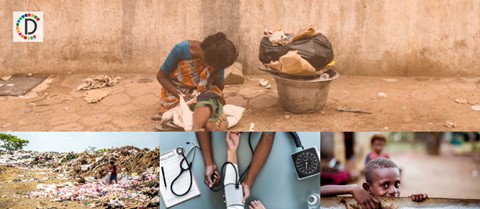Reuters Health News Summary

Following is a summary of current health news briefs. J&J blockbuster loses ground to biosimilars despite Quebec court ruling
Johnson & Johnson's Remicade, a blockbuster drug that treats autoimmune disorders, has steadily lost market share among patients enrolled in the Canadian province of Quebec's public drug program, even after a court ruling reinstated full coverage in January, a Reuters analysis of government data shows. The plan's administrator stopped covering Remicade, J&J unit Janssen's version of the drug infliximab, for some new patients in February 2017, in favor of cheap near-copies called biosimilars, mainly Pfizer Inc's version of infliximab, called Inflectra. In January, a Quebec court ordered it to resume coverage. Rollout of Johnson & Johnson Ebola vaccine begins in Congo
Health authorities in eastern Congo have introduced a new Ebola vaccine produced by Johnson & Johnson, aid group MSF said on Thursday, to help combat the world's second-worst outbreak of the virus on record. New tools including vaccines have helped contain the outbreak, second only to the 2013-16 West African outbreak that killed more than 11,300, despite public mistrust and conflict affecting the response in parts of the region. Climate change exposes future generations to life-long health harm
A child born today faces multiple and life-long health harms from climate change - growing up in a warmer world with risks of food shortages, infectious diseases, floods and extreme heat, a major global study has found. Climate change is already harming people's health by increasing the number of extreme weather events and exacerbating air pollution, according to the study published in The Lancet medical journal. And if nothing is done to mitigate it, its impacts could burden an entire generation with disease and illness throughout their lives. N.Y. insurance regulator notifies opioid makers, distributors of enforcement action: sources
New York's insurance regulator has formally notified a group of opioid manufacturers and distributors that it will launch a civil enforcement action against them for contributing towards a rise in health insurance premiums in the state, said two sources familiar with the matter. The New York State Department of Financial Services (NYDFS) has sent letters to around 23 opioid manufacturers and distributors, notifying them that the regulator would begin the process to hold a hearing on the issue in an administrative proceeding, the sources said. Apple Watch detects irregular heartbeats in U.S. study
Apple Inc's Heart study, the largest yet to explore the role of wearable devices in identifying potential heart problems, found the device could accurately detect atrial fibrillation, the most common type of irregular heartbeat, U.S. researchers reported on Wednesday. The results, published in the New England Journal of Medicine (NEJM), come as technology companies increasingly strike up partnerships with drugmakers as a way to gather large amounts of real-time health data on individuals. As swine fever fries China vaccine sales, Boehringer rewrites prescription for recovery
Germany's Boehringer Ingelheim, the global No. 2 in animal health, is having to rebuild itself in China after a deadly pig disease decimated sales of unrelated mainstay vaccines, bringing write-offs and leaving it facing a three-year slog to recovery. Fresh from launching a brand new vaccine factory in eastern China this year, the privately held company will focus more on larger customers and invest in diagnostics after sales plunged by about 40%, or the same level as the contraction of the world's largest hog herd, said Stephan Lange, head of animal health for mainland China, Hong Kong and Taiwan. Antibiotic-resistant infections killing twice as many Americans as once thought
Nearly twice as many people are dying in the United States from antibiotic-resistant infections than previously believed, U.S. health officials said on Wednesday, as so-called "superbugs" alarm experts with their rate of growth and spread. Issuing its first comprehensive report into the growing health threat in six years, the U.S. Centers for Disease Control and Prevention said it had determined that 2.8 million antibiotic resistant infections occur each year, killing 35,000 people. Sliding UK health service performance sparks pre-election war of words
Britain's National Health Service recorded its worst ever performance in treating patients on emergency wards last month, a blow to Prime Minister Boris Johnson's claim that only his Conservatives can safeguard the cherished institution. The state-run NHS has provided free at the point of use healthcare for more than 70 years and is a highly emotive issue before the Dec. 12 election, with voters rating it as the second most important subject after Brexit. FDA panel votes against Lilly-Boehringer Ingelheim's diabetes drug
Independent experts on an FDA advisory panel on Wednesday voted against the use of an already approved diabetes drug from Eli Lilly and Co and Boehringer Ingelheim as an add-on to insulin therapy in patients with type 1 diabetes. Empagliflozin belongs to a class of drugs called SGLT2 inhibitors, like Johnson & Johnson's Invokana and AstraZeneca Plc's Farxiga, which lower blood sugar by increasing the excretion of glucose through urine. Big, fast cull in South Korea over swine fever raises safety concerns
An extensive, rapid slaughter of hogs to control an outbreak of African swine fever has sparked concern over whether South Korea is prepared to dispose of the culled animal, as reports emerged this week a river was contaminated by pig blood. Authorities have slaughtered about 380,000 pigs since the outbreak was reported in September to contain the disease, all in a northern region bordering North Korea.
(This story has not been edited by Devdiscourse staff and is auto-generated from a syndicated feed.)
ALSO READ
South Korea launches its 2nd military spy satellite amid animosities with North Korea
China communist party politburo member Zhao to lead delegation to North Korea
US envoy to UN to visit Korean border, North Korean defectors
China communist party politburo member Zhao to lead delegation to North Korea
China top legislator and North Korea counterpart discuss promoting ties - KCNA










